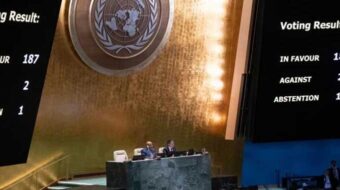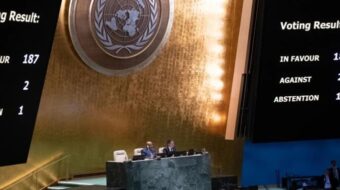WASHINGTON — A crowd at the Cuban Interest Section here applauded warmly March 29 as Ambassador Dagoberto Rodriguez Berrera assailed Bush administration hypocrisy on “human rights” in Cuba. Cuba, he said, will never bow to U.S. diktat.
The meeting was called to respond to a U.S.-sponsored resolution now pending before the United Nations Human Rights Commission (UNHRC) in Geneva that cites Cuba for violations of human rights.
Rodriguez reminded the crowd of the torture and abuse of detainees at U.S. military prisons around the world — none of which has been condemned by the UNHRC.
“There are plenty of lies and double standards,” he said. “For the poor, there will be no enjoyment of human rights. Over 130 countries in the Third World are denied the right to development. With no access to markets, they are handcuffed. The people in these countries do not even have the right to life. More than 11 million children die of hunger, malnutrition and preventable diseases each year.”
Yet Cuba’s infant mortality rate is lower than the U.S. and no Cuban children go hungry, he said.
Shirley Pate, a board member of an ecumenical religious group Epica (www.epica.org), read a petition she had drafted urging UNHRC member states “to stand firm … and to vote ‘No’ on any U.S.-conceived condemnation of Cuba. …Whether it is the U.S. treatment of prisoners in Guantanamo Bay and Abu Ghraib or treatment of its own incarcerated citizens, the United States government lacks the moral authority to judge the human rights of any country, least of all Cuba.” The crowd gave her a standing ovation.
The current session of the UNHRC runs from March 14 through April 22.
Last year, the U.S. succeeded in ramming through an anti-Cuba resolution by a one-vote margin. But this year, Undersecretary of State Mark Logan announced April 1 that the United States itself would introduce a resolution against Cuba. Apparently the U.S delegation was unable to find another nation to do its bidding. A vote is expected April 14.
Over 2,100 of the world’s intellectuals released a statement March 14 rejecting the U.S. moves. It noted that in Cuba there is not a single case of a missing person, torture or extra-judicial killing. The signers included a few, notably José Saramago, Howard Zinn, and Eduardo Galeano, who signed a petition in 2003 criticizing Cuba for jailing dissidents.
The U.S. resolution focuses on dissidents jailed two years ago who fell afoul of Cuban laws against taking foreign money for anti-government activities.
Adriana Perez and Olga Salanueva, wives of Gerardo Hernandez and Rene Gonzalez, two of the Cuban Five unjustly imprisoned in U.S. jails, spoke before the UNHRC March 29. They charged that the U.S. government violates their rights by rejecting their visa applications to visit their husbands in U.S. prisons. They also read statements from the five prisoners accusing the U.S. government of cruelties that impinge upon their dignity and that of the Cuban nation.
For the first time, Cuban Americans have gone to Geneva to label Bush measures against family visiting and monetary help for relatives in Cuba as “criminal.” According to Delvis Fernández Levy, president of the Cuban-American Alliance Education Fund, these are “violations to fundamental human rights and freedoms.”s

MOST POPULAR TODAY

High Court essentially bans demonstrations, freedom of assembly in Deep South

Resource wars rage in eastern Congo, but U.S. capitalism only sees investment opportunity

U.S. imperialism’s ‘ironclad’ support for Israel increases fascist danger at home

UN warns that Israel is still blocking humanitarian aid to Gaza







Comments